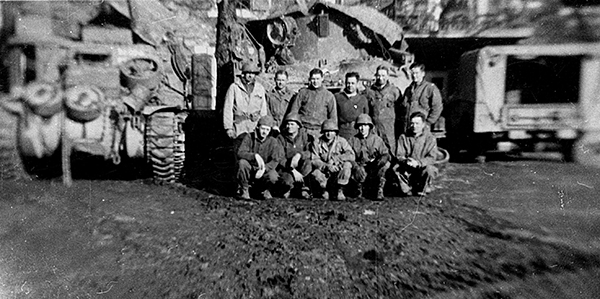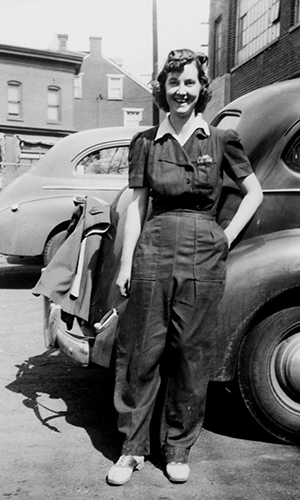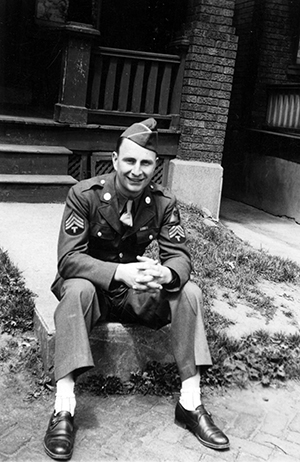I'll Be Home for Christmas
- You can plan on me.
- Please have snow and mistletoe,
- And presents on the tree."
By DAVE BERRY
"I'll be home for Christmas," made my mother cry - every Christmas for 70 years.
Few things made Neva Berry so emotional, but the words to that song, first crooned by Bing Crosby in 1943, always brought tears.
Dad missed four Christmas holidays during World War II. The first was Christmas 1941, going through tank engine maintenance training at Fort Knox, Kentucky. Earlier that month, a game of indoor volleyball had been halted by radio reports of the bombing of Pearl Harbor. No one would go home any time soon.

The second Christmas, in 1942, he and Mom had it all planned out. They were to be married during his furlough. The wedding was set for Christmas Eve. But the Army delayed his furlough by two weeks and they tied the knot on Jan. 8. Dad headed back to Camp Pickett, Virginia, then on to Indiantown Gap, Pennsylvania, where his new bride would join him later in the year.
They had six great months together, but by Christmas 1943, Dad was overseas, having sailed with the Third Armored Division to England. While Dad waited for the invasion of France, Mom moved to Marion, Indiana, pursuing a college degree by day and working nights in a defense plant, the Anaconda Wire Company. She often worked seven days a week putting rubber patches on heavy undersea wire. "We wore blue overalls with a clean white collar every day," she said. "We traveled from the dorm by street car to the plant at 3 p.m. and worked until 11 p.m. Later we worked the 11 p.m. to 7 a.m. shift."
That year, when Bing Crosby's "I'll Be Home for Christmas" debuted, she was alone and far from Oklahoma and Kansas. Neither she nor Les would be home for Christmas.

- Where the love light gleams.
- I'll be home for Christmas,
- If only in my dreams."
But the toughest time apart came on Christmas 1944. The song that filled the airwaves was written from the point of view of a homesick soldier away from home during World War II, and it tugged at the hearts of an entire country. It was hard on Mom, working and going to school far from home. She hadn't seen her new husband for almost a year and a half.
- You can plan on me.
- Please have snow and mistletoe,
- And presents on the tree."
In the months leading up to Christmas 1944, Lester Berry was in the thick of the fighting. His tank repair company followed the battle tanks through the Siegfried Line and into Germany, where the division saw almost continuous fighting. His tank battalion, which normally had 34 Sherman tanks, "had fourteen tanks left... then we lost seven of those," he wrote.
Exhausted, their supply lines stretched thin, the division was pulled from the front lines to a stable defensive position, where they drew new tanks with bigger guns and more powerful engines to replace those that had been knocked out. Dad's maintenance company worked around the clock to repair and service the rest. They got three days of rest, then were thrown back into the fight. So it went through September, November and into December.
The mechanics were not immune from danger. Dad had already lost his best friend Gordon and two others from his small maintenance unit as the Spearhead Division punched through France. Now, in Germany, American soldiers were on the offensive, and Germany was reeling. Men on the front lines and Americans back home believed the war would be over soon. The promise in Bing Crosby's song seemed almost possible.
- Where the love light gleams.
But their hopes of being home for Christmas were soon dashed when Germany's big counter-offensive caught everyone off guard. The Battle of the Bulge had begun. Overstretched American divisions were pushed back with terrible losses along the Ardennes Forest in Belgium. To stop Hitler's final push, thousands of soldiers would be thrown in the bloodiest battle of World War II.

- If only in my dreams.
- If only in my dreams."
When Christmas rolled around again, Dad was part of the stubborn defense of the roads, towns and supply points sought by the Germans. Men fought the cold and the enemy, and Dad recalled seeing Americans loading what fuel they could save, then setting fire to enormous fuel depots. He saw German crews abandon their tanks that had run out of gas. Hitler's offensive was stopped 18 miles short of its goal.
The cost was enormous. The Americans had lost 89,500 casualties - 19,000 killed, 47,500 wounded and 23,000 missing in the bitter cold and carnage of battle. By mid-January, when the Bulge was pinched off and lines restored, Dad reported that his battalion was "again almost out of tanks."
It would be another nine months before Dad came home. Neva received her degree and waited on the farm in Kansas. Germany surrendered in May, but the war in the Pacific raged on. Both worried his division would be sent to fight Japan. When Japan surrendered in September, he was on a liberty ship heading for home.
He would be home for Christmas 1945, and together, they would celebrate another 55 Christmas seasons. It was important to her - having everyone home for the holidays. And as much as possible over the years, our family has tried to go "home for Christmas" as well.
I hope it's important to you. Merry Christmas and Happy Holidays!
Dave Berry is the former editor of the Tyler Morning Telegraph. His weekly Focal Point column ran for three years. This one was published Dec. 23, 2015.
Photos: Top - Tech Sgt. Lester Berry (second from right in back row) commanded a tank retriever for a maintenance company in the Third Armored Division. Taken somewhere in Germany, this photo is all we have of him and his crew. Middle - During the war, Neva Berry took college classes by day and served the war effort by working seven days a week on the night shift at Anaconda Wire Company. Bottom: Lester Berry just before shipping out for England.
